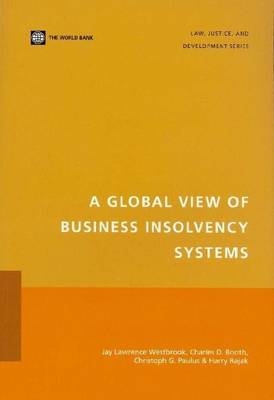
A Global View of Business Insolvency Systems
Seiten
2010
World Bank Publications (Verlag)
978-0-8213-8261-5 (ISBN)
World Bank Publications (Verlag)
978-0-8213-8261-5 (ISBN)
Analyses how legal systems around the world respond to the general default of business debtors. It emphasizes the close inter-relationship among various elements of an insolvency regime, examining them not so much as sets of discrete rules as system-wide attempts to reconcile competing policy goals.
The recent crises underscore the need for modern, sophisticated systems to govern the resolution of business distress, in order to maximis value in the distressed estate and to protect economic institutions. This work analyses how legal systems around the world respond to the general default of business debtors. Inspired by the approach enshrined in the World Bank's Principles for Effective Insolvency and Creditor Rights Systems, it emphasizes the close inter-relationship among various elements of an insolvency regime, examining them not so much as sets of discrete rules as system-wide attempts to reconcile competing policy goals. It posits that any insolvency law pursues the goals of transparency, predictability, and efficiency, while at the same time seeking to address issues of fairness and social justice.
Within this framework, the authors examine the principal international approaches to pre-distress debt collection and security enforcement; liquidation and reorganisation of distressed businesses; out-of-court workouts; the institutions entrusted with the conduct of such proceedings, including courts, official administrators, and private trustees; the position of the employees of distressed businesses; and cross-border insolvency. Without being prescriptive, the authors set out the costs and benefits of settling the myriad policy questions in these domains one way or another.
The recent crises underscore the need for modern, sophisticated systems to govern the resolution of business distress, in order to maximis value in the distressed estate and to protect economic institutions. This work analyses how legal systems around the world respond to the general default of business debtors. Inspired by the approach enshrined in the World Bank's Principles for Effective Insolvency and Creditor Rights Systems, it emphasizes the close inter-relationship among various elements of an insolvency regime, examining them not so much as sets of discrete rules as system-wide attempts to reconcile competing policy goals. It posits that any insolvency law pursues the goals of transparency, predictability, and efficiency, while at the same time seeking to address issues of fairness and social justice.
Within this framework, the authors examine the principal international approaches to pre-distress debt collection and security enforcement; liquidation and reorganisation of distressed businesses; out-of-court workouts; the institutions entrusted with the conduct of such proceedings, including courts, official administrators, and private trustees; the position of the employees of distressed businesses; and cross-border insolvency. Without being prescriptive, the authors set out the costs and benefits of settling the myriad policy questions in these domains one way or another.
| Erscheint lt. Verlag | 30.3.2010 |
|---|---|
| Verlagsort | Washington |
| Sprache | englisch |
| Themenwelt | Recht / Steuern ► EU / Internationales Recht |
| Recht / Steuern ► Wirtschaftsrecht ► Bank- und Kapitalmarktrecht | |
| ISBN-10 | 0-8213-8261-6 / 0821382616 |
| ISBN-13 | 978-0-8213-8261-5 / 9780821382615 |
| Zustand | Neuware |
| Haben Sie eine Frage zum Produkt? |
Mehr entdecken
aus dem Bereich
aus dem Bereich
Einkommensteuer, Körperschaftsteuer, Gewerbesteuer, Bewertungsgesetz …
Buch (2024)
Springer Gabler (Verlag)
CHF 39,15
CRR, IFR, SSM-VO, SRM-VO, EBA-VO
Buch | Softcover (2024)
dtv Verlagsgesellschaft
CHF 30,65
Währung, Bankenaufsicht, Zahlungsverkehr/Kredit
Buch | Softcover (2024)
dtv Verlagsgesellschaft
CHF 30,65


